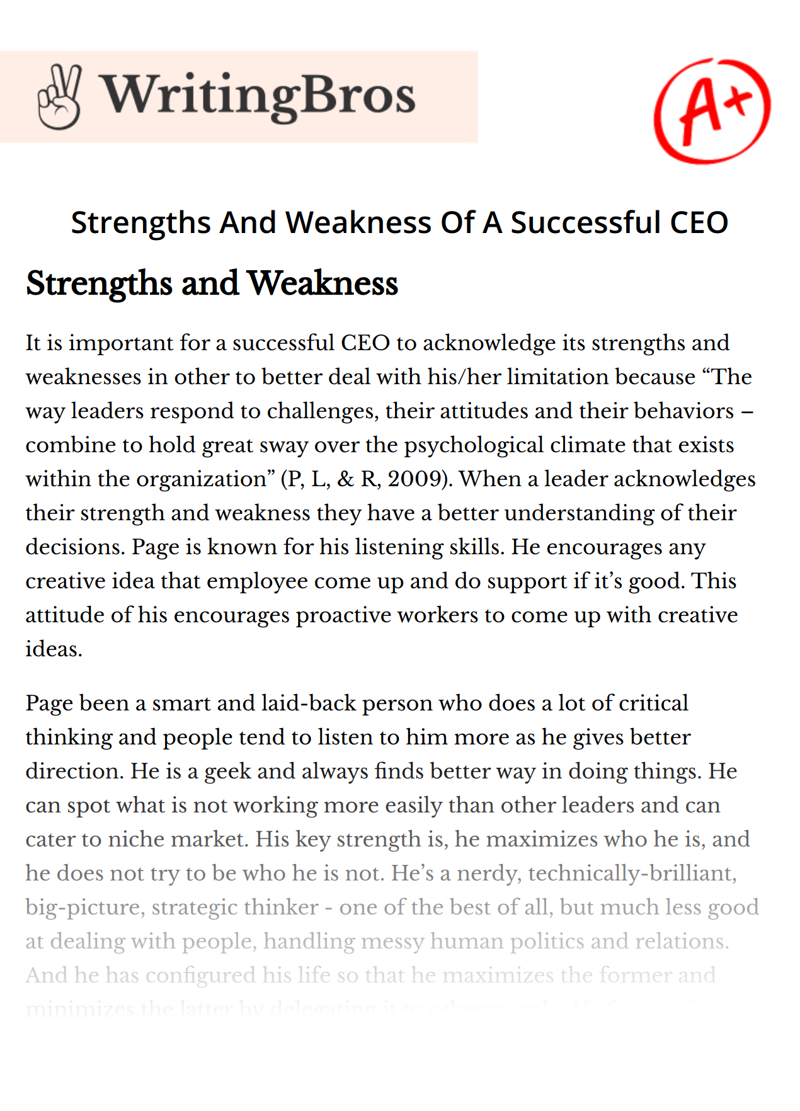Strengths And Weakness Of A Successful CEO

Strengths and Weakness
It is important for a successful CEO to acknowledge its strengths and weaknesses in other to better deal with his/her limitation because “The way leaders respond to challenges, their attitudes and their behaviors – combine to hold great sway over the psychological climate that exists within the organization” (P, L, & R, 2009). When a leader acknowledges their strength and weakness they have a better understanding of their decisions. Page is known for his listening skills. He encourages any creative idea that employee come up and do support if it’s good. This attitude of his encourages proactive workers to come up with creative ideas.
Page been a smart and laid-back person who does a lot of critical thinking and people tend to listen to him more as he gives better direction. He is a geek and always finds better way in doing things. He can spot what is not working more easily than other leaders and can cater to niche market. His key strength is, he maximizes who he is, and he does not try to be who he is not. He’s a nerdy, technically-brilliant, big-picture, strategic thinker - one of the best of all, but much less good at dealing with people, handling messy human politics and relations. And he has configured his life so that he maximizes the former and minimizes the latter by delegating it to other people. He focuses his attention on where he - as the person he is - can have the largest impact, leveraging his (very considerable) strengths through the role he has created for himself in the Alphabet. Like every individual, Page has weakness too, he is over ambitious which often causes trouble for his fellow engineers who are working with him.
At times he puts people off with the amount of risk involved, as the challenge market leaders. He has conflicts with people who resist changes. People describe him as he is too laid back early on and sometimes has to make up for lack of input later. Larry Page Personal and Organizational Value. Page had to portray more traits other than intelligence. Larry Page personal value was in close proximity with that of Google and this is actually reflected the tremendous success that was recorded by him as a CEO of one of the best organization in the world to work. Much of the success achieved by the company can be attributed to his supportive attitude that entrenches a “don’t be evil” approach. This is reflected by his unending efforts to ensure that every employee in the company sees it as a family (Reginald & Gardner, 2008). When he was Google’s CEO, employees were treated to wide range of benefits which includes free meals, free massages, healthcare, and form of pensions when family loses their loved ones. (Google, 2013). Another personal trait of Page is that he is very flexible. He possesses the ability to detect the needs and demands of the ever-changing modern environment. Fumbling events in Larry’s lifeLife wasn’t easy for the Tech geek either, there were lots of up and downs in his career.
There was a time he fired all the Project Managers and did a reorganization in Google. This didn’t go well with the employees, and the model started to fail as project that needed resources failed to get them and people craved for feedback. Google started hiring Project Manager later. In 2001, Schmidt became Google’s CEO, there was so called adult supervision for Page. Larry Page was Google’s Steve Jobs then. Google’s investors forced Page to hire a CEO to adult supervision, though Page was visionary and driving force for Google. About a year Page had to remove himself from day-day activities of Google. Later, Page came back with wild ambitions. Ethical BehaviorPage tends to communicate through dynamic body language. If he finds an idea stupid, he lifts his left eyebrow. If someone said anything that made him angry or uncomfortable, he would respond in a quitter tone. He is famous for his lack of social grace. Page interacted with Googlers in a way he fought with Brian, this offended many of them. He encouraged executives to fight like Brian and him. He created an interpersonal culture, and intensely focused on ideas and its outcomes rather than emotions.
Larry’s Rules of Management:
- Don't delegate: Do everything you can yourself to make things go faster.
- Don't get in the way if you're not adding value. Let the people actually doing the work talk to each other while you go do something else.
- Don't be a bureaucrat.
- Ideas are more important than age. Just because someone is junior doesn't mean they don't deserve respect and cooperation.
- The worst thing you can do is stop someone from doing something by saying, "No. Period. " If you say no, you must help them find a better way to get it done.
Cite this Essay
To export a reference to this article please select a referencing style below

